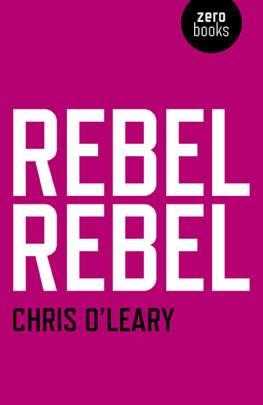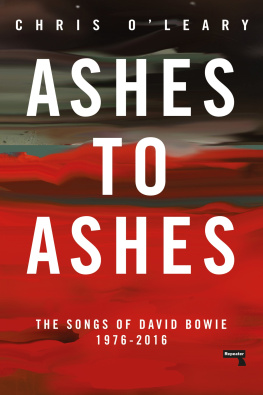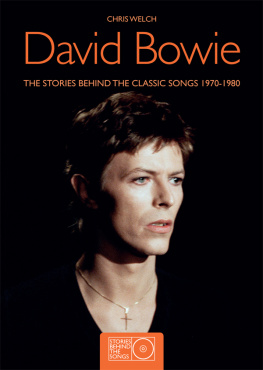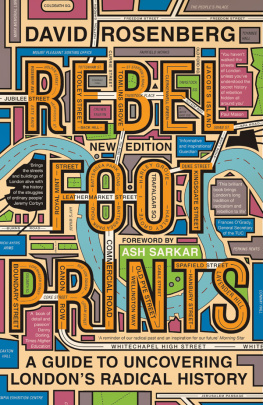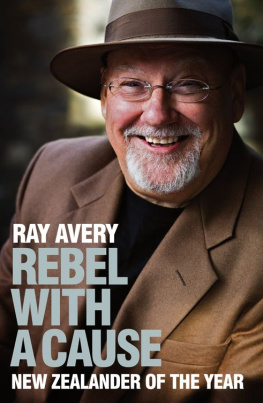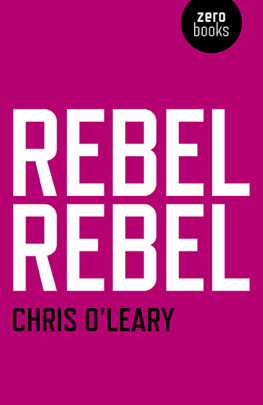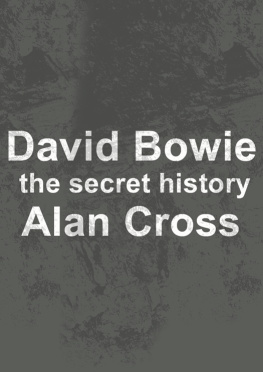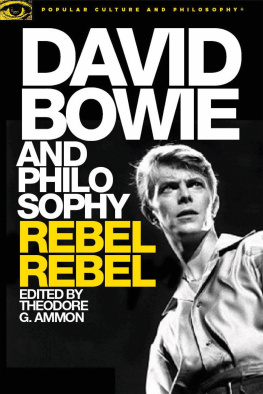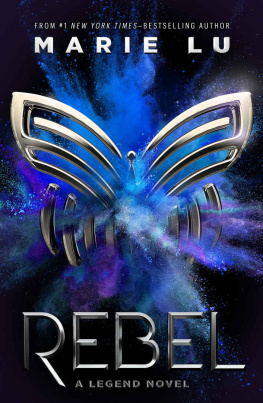Chris O’Leary - Rebel Rebel: All the Songs of David Bowie from ’64 to ’76
Here you can read online Chris O’Leary - Rebel Rebel: All the Songs of David Bowie from ’64 to ’76 full text of the book (entire story) in english for free. Download pdf and epub, get meaning, cover and reviews about this ebook. year: 2015, publisher: Zero Books, genre: Non-fiction / History. Description of the work, (preface) as well as reviews are available. Best literature library LitArk.com created for fans of good reading and offers a wide selection of genres:
Romance novel
Science fiction
Adventure
Detective
Science
History
Home and family
Prose
Art
Politics
Computer
Non-fiction
Religion
Business
Children
Humor
Choose a favorite category and find really read worthwhile books. Enjoy immersion in the world of imagination, feel the emotions of the characters or learn something new for yourself, make an fascinating discovery.
- Book:Rebel Rebel: All the Songs of David Bowie from ’64 to ’76
- Author:
- Publisher:Zero Books
- Genre:
- Year:2015
- Rating:4 / 5
- Favourites:Add to favourites
- Your mark:
- 80
- 1
- 2
- 3
- 4
- 5
Rebel Rebel: All the Songs of David Bowie from ’64 to ’76: summary, description and annotation
We offer to read an annotation, description, summary or preface (depends on what the author of the book "Rebel Rebel: All the Songs of David Bowie from ’64 to ’76" wrote himself). If you haven't found the necessary information about the book — write in the comments, we will try to find it.
Chris O’Leary: author's other books
Who wrote Rebel Rebel: All the Songs of David Bowie from ’64 to ’76? Find out the surname, the name of the author of the book and a list of all author's works by series.
Rebel Rebel: All the Songs of David Bowie from ’64 to ’76 — read online for free the complete book (whole text) full work
Below is the text of the book, divided by pages. System saving the place of the last page read, allows you to conveniently read the book "Rebel Rebel: All the Songs of David Bowie from ’64 to ’76" online for free, without having to search again every time where you left off. Put a bookmark, and you can go to the page where you finished reading at any time.
Font size:
Interval:
Bookmark:

First published by Zero Books, 2015
Zero Books is an imprint of John Hunt Publishing Ltd., Laurel House, Station Approach,
Alresford, Hants, SO24 9JH, UK
www.johnhuntpublishing.com
www.zero-books.net
For distributor details and how to order please visit the Ordering section on our website.
Text copyright: Chris OLeary 2014
ISBN: 978 1 78099 244 0
Library of Congress Control Number: 2014948079
All rights reserved. Except for brief quotations in critical articles or reviews, no part of this book may be reproduced in any manner without prior written permission from the publishers.
The rights of Chris OLeary as author have been asserted in accordance with the Copyright, Designs and Patents Act 1988.
A CIP catalogue record for this book is available from the British Library.
Design: Stuart Davies
Printed and bound by CPI Group (UK) Ltd, Croydon, CR0 4YY, UK
We operate a distinctive and ethical publishing philosophy in all areas of our business, from our global network of authors to production and worldwide distribution.
The rock musician sat down for an interview. It was the early Eighties, barely midway through his half-century career: he would still be releasing new albums in 2014. Part of me is kinda like an actor, he said. If I dont have something happening directly about my life, I can take from experiences around me and then by way of becoming another person, another persona, I can express a buncha fuckin feelings. That was Neil Young. And heres Mick Jagger, interviewed in the early Seventies. If youre a method actor, you always stay in character[my character] has changed a lot. Its not just one change every six months, another person.
Pop music is acting: it always has been. Yet only David Bowie got the rap for being rocks pantomime artiste, its greatest pretender. He happily owned up to the charge, calling himself The Actor on the sleeve of Hunky Dory, the faker in Changes. Today, with Bowie a cross-national cultural icon (one can imagine his face on a Euro note someday), it may be hard to believe he was once considered the epitome of weedy English decadence. That he was seen as a fraud, as an affront to the realness of Sixties rock and roll. That he was suspect.
He agreed with his critics, of course. There had never been so self-conscious an act as Bowies in pop before. In part this was because hed had such a lengthy incubation, as a marginal act in the mid-Sixtiesits still strange to realize his first single predates A Hard Days Nightand as a struggling folkie and rocker at the turn of the decade. Bowie spent the Sixties in the audience, standing in the corner of a club or perched off stage, always taking mental notes. There was something unique about Bowie, in his assimilative capabilities (and his pack-rat instincts), in his way of imagining himself as his own audience, and so working to entertain himself, first and foremost. And his long internship made him a consummate pro, ready to grab opportunities. The writer Nick Kent said that at Bowies London debut as Ziggy Stardust in 1972, there was an equipment malfunction just as the show began, creating a sudden agonizing silence [that] was instantly felt through the hall. Not missing a beat, Bowie pointed to each flamboyant article of clothing he was adorned in and recited the name of its designer in an exaggerated camp accent. When the band finally tore into Hang Onto Yourself, the audience was already tight in Bowies grasp.
Despite the hack reporters line about Bowie being a changeable musical chameleon, there was a deep continuity to his music. Riffs, chord progressions, phrases, lyrical subjects, amateur saxophone, sped-up Laughing Gnome voices: all reappear in his songs, even in the present decade. This book attempts to see how Bowies songs worked, how they were assembled, how they changed upon performance. Because Bowie was so consumed by whatever he chanced upon (books, SF films, underground newspapers, salsa records, Nazi documentaries), I wound up writing some potted cultural histories of 20th Century odds and ends. It was unavoidable: to get a grip on Bowie, you have to have a sense of his times. Only the prosperous, youth-heady, pop music emporia that was Britain and America in the Sixties and Seventies could have produced Bowie the rock musician. Had he come early in the 20th Century, he would have been a painter or a music hall performer; had he come today, hed likely be writing for Image Comics.
But if this book seems an effort to reveal a magicians tricks, thats not my intent. Consider it a travel atlas. By keeping to the ground and going through Bowies records song by song, you can slowly get a sense of the scale of Bowies achievementa body of work that holds up as well as anything from his era. Julie Welch, witnessing a Ziggy Stardust concert in 1973 at Earls Court (which the future Sid Vicious also attended), wrote that Bowie on stage was utilizing his most splendid gifthis sense of largeness and glory. As this book focuses on Bowies music, it has little room to examine other pieces of his oeuvre: his album covers, his photographs, his promotional videos and films, his costumes. Still, the music offers largeness and glory in spades.
This book is a guide to Bowies songs, from his first single, released in 1964, to the Station to Station album, released in January 1976. Our survey includes both released and (if I managed to hear them) unreleased songs. Feel free to zip around to find whichever songs you like. Or if youre of a more chronological bent, read it as a narrative, starting with the first entry. This book presumes a small amount of familiarity with David Bowie and his music. But if you have no clue about Bowie, no worries: all youll need is in the following few paragraphs.
David Bowie was born David Robert Jones, in Brixton in January 1947. He was the only son of Peggy Burns and Haywood John Jones, a publicity man whod once (disastrously) run a nightclub. Haywood had married before, both he and Peggy had children from previous entanglements, and David symbolized their much-delayed entry into lower-middle-class life. Unsurprisingly, David lacked for little in his youth. He went to Bromley Tech (the Bowies had moved to Bromley, a suburb of London, in the early Fifties) and left school in 1963. He wanted to be a famous pop musician and spent the Sixties in pursuit of that ambition, burning through a set of bands, record labels and managers in the process, with no commercial success.
Disillusioned with and considering abandoning professional music, Bowie got a novelty hit (Space Oddity) in late 1969. He struggled to follow it up. Finally, thanks to the acumen of his wife (Angela Barnett), his ruthless manager (Tony Defries), a sympathetic producer (Ken Scott), a brilliant guitarist/arranger (Mick Ronson) and the full flowering of his songwriting, Bowie became a British rock star with the release of The Rise and Fall ofZiggy Stardust and the Spiders From Mars in June 1972. Soon to follow were #1 albums, Top 10 hits, headlining the Hammersmith Odeon and Radio City Music Hall.
Memories of his post-Space Oddity limbo had made Bowie craftier and he discarded the Ziggy Stardust image at its peak of fame, playing his last show as Ziggy in July 1973 and soon afterward breaking up his band. Looking for an American hit (hed had good press in the US but weak sales), he left Britain for America in 1974. He began exploring soul and R&B while becoming vigorously addicted to cocaine; he got a US #1 hit (Fame), a starring role in a film,
Font size:
Interval:
Bookmark:
Similar books «Rebel Rebel: All the Songs of David Bowie from ’64 to ’76»
Look at similar books to Rebel Rebel: All the Songs of David Bowie from ’64 to ’76. We have selected literature similar in name and meaning in the hope of providing readers with more options to find new, interesting, not yet read works.
Discussion, reviews of the book Rebel Rebel: All the Songs of David Bowie from ’64 to ’76 and just readers' own opinions. Leave your comments, write what you think about the work, its meaning or the main characters. Specify what exactly you liked and what you didn't like, and why you think so.

